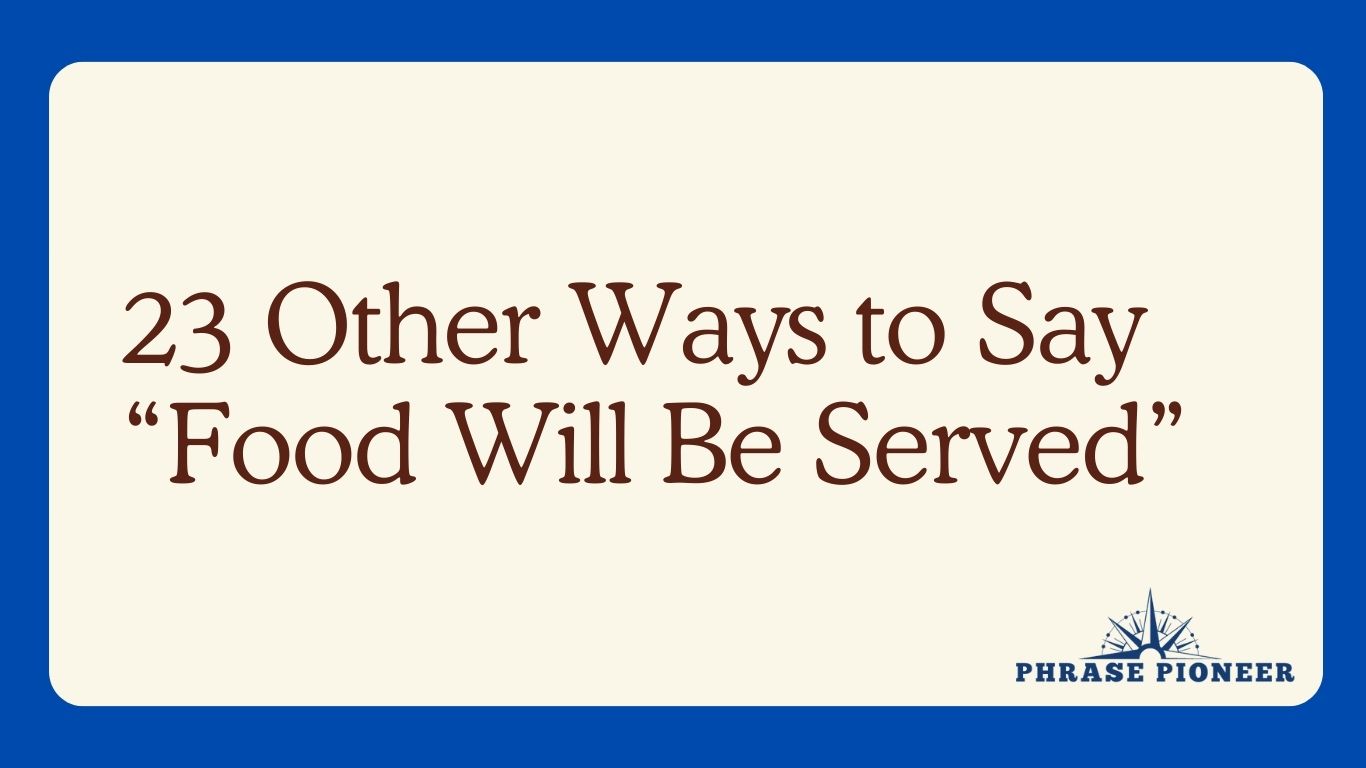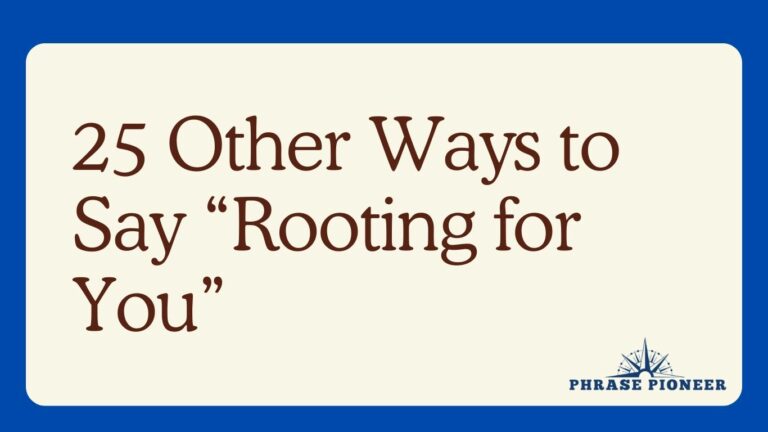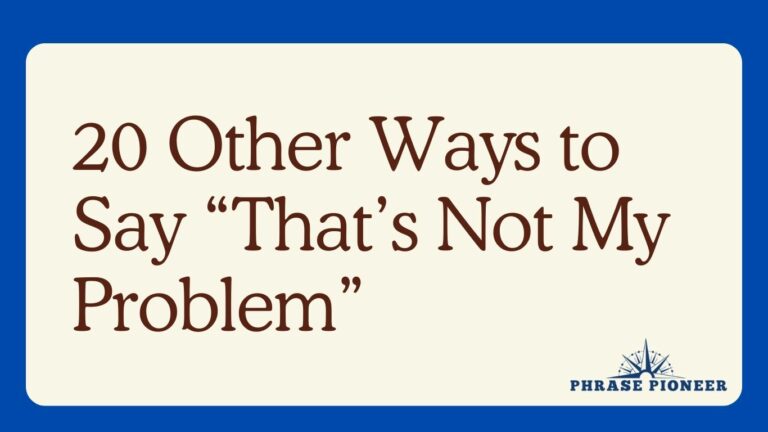23 Other Ways to Say “Food Will Be Served”
Informing guests that “Food will be served” is a straightforward way to let them know they can expect a meal at your event.
Depending on the type of event, the formality, and how you want to phrase the information, there are various ways to communicate this.
Here are 23 alternative ways to say “Food will be served,” each with an example sentence and explanation to illustrate how to use these alternatives effectively.
Informal and Casual Announcements
- We’ve got eats covered
- Example: “Don’t worry about dinner; we’ve got eats covered at the party.”
- Explanation: A casual, slang way to indicate that food is taken care of, suitable for relaxed or informal gatherings.
- Grub’s on us
- Example: “Come hungry because the grub’s on us tonight!”
- Explanation: ‘Grub’ is an informal term for food, and this phrase indicates that food will be provided without cost to the guests.
- A spread of food awaits
- Example: “Join us for the game night where a spread of food awaits you.”
- Explanation: Evokes a visual of a variety of food, indicating that there will be plenty to choose from.
- Tasty bites to be enjoyed
- Example: “There will be plenty of tasty bites to be enjoyed at the reception.”
- Explanation: Implies that there will be appetizers or small servings of food available for guests’ enjoyment.
- Come feast with us
- Example: “We’re firing up the grill—come feast with us this Saturday!”
- Explanation: An inviting and spirited way to suggest that there will be more than enough food, possibly a barbeque or potluck-style meal.
Specific Meal Indicators
- Refreshments will be provided
- Example: “After the workshop, refreshments will be provided in the lobby.”
- Explanation: Typically implies that lighter food options or drinks will be available rather than a full meal.
- Dinner will be served
- Example: “Formal attire is requested since dinner will be served at the event.”
- Explanation: Specifies that a full dinner meal will be part of the event, often used for more formal occasions.
- A banquet to be laid out
- Example: “The wedding celebration will include a banquet to be laid out for all guests.”
- Explanation: Suggests a formal or elaborate meal, which might be a buffet or seated dinner.
- Buffet-style meal available
- Example: “Please join us for our annual gathering, with a buffet-style meal available to all attendees.”
- Explanation: Indicates the specific manner of food service being offered, which is self-service from a variety of dishes set out for guests.
- Culinary delights on offer
- Example: “At our gallery opening, enjoy the art and the culinary delights on offer.”
- Explanation: Implies that the food itself will be a notable attraction, suggesting a more gourmet or sophisticated fare.
Gentle Confirmations
- Lunch will be on hand
- Example: “During the seminar break, lunch will be on hand for all participants.”
- Explanation: Confirms availability, presenting the meal as ready and easily accessible.
- Snacks to be had
- Example: “Movie night is planned, with plenty of popcorn and snacks to be had.”
- Explanation: Indicates that lighter fare or snack food will be available in a casual context.
- Food aplenty for all
- Example: “At the family reunion, there will be food aplenty for all, so come hungry!”
- Explanation: Suggests a generous amount of food with an emphasis on abundance and hospitality.
- Delicious provisions awaiting
- Example: “Rest assured, delicious provisions awaiting our guests is our top priority.”
- Explanation: Ensures guests that not only will food be available, but it will be enjoyable and thoughtfully prepared.
- Nourishment to be shared
- Example: “We value community, which is why there will be nourishment to be shared at our gathering.”
- Explanation: Presents the meal as part of the experience of coming together and sharing as a group.
Formal Invitations
- A meal will be presented
- Example: “During the intermission, a meal will be presented to our honored patrons.”
- Explanation: A formal declaration that there will be a meal provided, typically implying more refined dining.
- Dining service to commence
- Example: “Upon completion of the awards ceremony, dining service will commence.”
- Explanation: Sets a specific time when the meal service will begin, often used in highly structured or formal events.
- Catering to be enjoyed
- Example: “Our corporate retreat will include catering to be enjoyed by all employees.”
- Explanation: Indicates planned and organized food service, usually by a professional catering company.
- A repast to follow
- Example: “After the memorial service, a repast to follow will be held in the fellowship hall.”
- Explanation: A repast refers to a meal after a ceremony or event, often a funeral or memorial, and is a traditional term used to describe the accompanying gathering.
- Cocktails and hors d’oeuvres served
- Example: “Join us for an evening of networking, with cocktails and hors d’oeuvres served throughout.”
- Explanation: Specifies the type of food and drink that will be available, typically indicating a more upscale social event.
Reassuring Participants
- Leave room for refreshments
- Example: “Our program runs through lunch, so leave room for refreshments afterward.”
- Explanation: Advises guests to anticipate the meal, suggesting they might want to save their appetite.
- Provisions made for dining
- Example: “Please note, provisions made for dining will accommodate all dietary restrictions.”
- Explanation: ‘Provisions’ is a formal way to refer to making preparations, and it includes details about accommodating special needs.
- Prepare for a feast
- Example: “Our annual festival is fast approaching—prepare for a feast as part of the celebrations!”
- Explanation: Invites attendees to expect an abundant and festive dining experience.
Choosing the appropriate wording can establish the ambiance and expectations for an event, whether it’s a casual get-together or a formal affair.
These alternative expressions range from friendly and laid-back to formal and assured, allowing for flexibility in how you let guests know a meal will be part of their experience.







